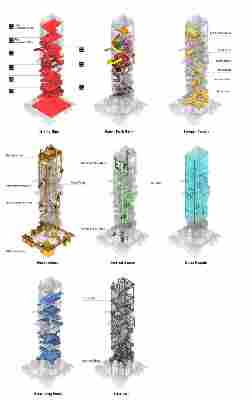The cryptocurrency and blockchain industry has thrown out its fair share of zany ideas over the last few years. But a group of designers is taking wild blockchain concepts to new heights with their plans for a cryptocurrency mining facility hidden in a skyscraper water park in Tehran, Iran.

Yeah, I don’t know where to start either. But let’s try.
The plans show a cryptocurrency mining farm, swimming pools, shopping mall, food court, and a spa all wrapped around each other, blurring the lines between form and true function.
The idea is to create an off-grid, glass-encased water park that secretly mines cryptocurrency all day, every day, all year long.


The plans have been proposed in response to US sanctions being placed on Iran and were submitted to this year’s eVolo architecture magazine skyscraper competition, Design Boom reports .
The tower is designed to address three key challenges associated with covertly mining cryptocurrency: cooling, energy, and secrecy.
The tower would house a tank at the very top to provide water for the swimming park, and cooling for the cryptocurrency mining hardware; it’ll also generate energy as it flows down from the top of the tower through hydroelectric turbines.
Credit: Design Boom
The water park, food court, and other leisure facilities would provide the cover and disguise for what is really going on beneath: cryptocurrency mining.
If the plans materialize, the skyscraper would tower 560 meters over Tehran from the Abbas Abad Hills.
Designers are dubbing it the post-JCPOA tower as a political statement against the anti-nuclear Joint Comprehensive Plan of Action (JCPOA) sanctions placed against the country.
But, why?
The JCPOA sanctions placed on Iran created a number of challenges for the country. One of the main difficulties was having to reduce the number of Uranium processing plants (centrifuges) from 19,000 to 6,000 across the country. Tehran in particular reduced its number by half to 5,000. Naturally, Iran’s economy suffered .
However, sanctions are being lifted, and Iran is beginning to rebuild its economy.
This group of designers saw that cryptocurrency should be part of the new opportunity. The entirely off-grid tower that secretly deals in anonymized cryptocurrencies also makes it very difficult for foreign countries to stick their hand where Iran doesn’t want it. Consider that another metaphorical jab at the sanctions.
What’s more, in the face of economic hardships that result from the sanctions, the tower also provides a place that gives locals some enjoyment and fun.
Indeed, it looks like a feasible idea on paper. But sadly, it wasn’t enough to wow judges at this year’s eVolo competition, where Serbian designer Marko Dragicevic claimed the top spot with his idea for a skyscraper that serves as landfill and recycling plant.
For now, we’ll have to chalk this up as another vision of a blockchain future that might never come true.
Credit: Design Boom
Google bans cryptocurrency mining apps from the Play Store
Google has now banned all cryptocurrency miners from the Play Store. Apps that manage mining hardware are apparently okay, though – for now.

The new ruling is hidden amongst the July updates to Google’s Developer Policy Center, as spotted by Android Police. It can be seen as a follow-up to their previous set of restrictions, which saw all extensions associated with cryptocurrency mining removed from the Chrome Web Store .
“We don’t allow apps that mine cryptocurrency on devices,” the new policy reads. “We permit apps that remotely manage the mining of cryptocurrency.”
It’s all probably to be expected – a hardline stance against surreptitious cryptocurrency mining is really on trend. Direct competitor Apple updated its own developer policies last month in a bid to protect its user base from being exposed to clandestine crypto-miners hidden in applications.
Apple does explicitly allow for some other crypto-apps, like those created by approved exchanges and for registered initial coin offerings (ICOs). But, the only iOS mining apps listed in the App Store are those that hash off-device through cloud mining.
While no timeframe has been given to take down the relevant apps already listed, it took Google two months to remove mining browser extensions after they were banned in April.
Measures like these are meant to protect the user from unknowingly mining cryptocurrencies for a third party. It’s also worth noting that charities have been using exactly the same scripts that allow for crypto-jacking . Instead of stealing your processing power, though, they ‘borrow’ it to mine Monero for good causes .
The jury is really still out on how effective these bans are at curbing the crypto-jacking epidemic. After all – it’s probably too early for reliable data.
(Note: An edit has been made to properly reflect that cloud-mining apps won’t be affected by this particular ban.)
Canadian banking cartel freezes $28M belonging to cryptocurrency exchange
A Canadian banking cartel has allegedly frozen $28 million in customer funds belonging to Canada’s largest cryptocurrency exchange.

Vancouver-based exchange desk QuadrigaCX claims the Canadian Imperial Bank of Commerce (CIBC) locked the money and froze accounts belonging to its payment partner, Costodian, and its owner, Jose Reyes. The intervention, which took place earlier in 2018, was allegedly absolutely arbitrary.
The Globe and Mail reports CIBC filed a request to take possession of the $28 million, as it is unable to determine exactly who it belongs to it – Quadriga, Costodian, or the 388 users who actually deposited the funds.
As Quadriga claims to have already credited accounts with something called ‘Quadriga Bucks’ – an intermediary token used to purchase cryptocurrencies on its exchange – it says it is the rightful owner of a majority of the money.
Seemingly unconvinced, CIBC requested an “interpleader order,” which would see the $28 million handed to the justice system, who would decide just who owns it.
Quadriga CEO Gerald Cotten says Quadriga is being unfairly targeted, just because they operate a cryptocurrency business.
“The number of individuals in the [B]itcoin community that have been shut out of the banking system is staggering,” Mr. Cotten reportedly said in an email to clients.
According to the emails, the ordeal is simply evidence of an active “conspiring” against the cryptocurrency sector in order to “stifle [Bitcoin] adoption” by the “Canadian banking cartel,” by making it more difficult to conduct regular business.
Of course, when pressed by reporters, Canada’s five biggest banks did not provide statements.
Spooky.
Craving more blockchain? Join us at Hard Fork Decentralized, our three-day event in London. We’ll discuss the industry’s future together. You can now register on our website !











